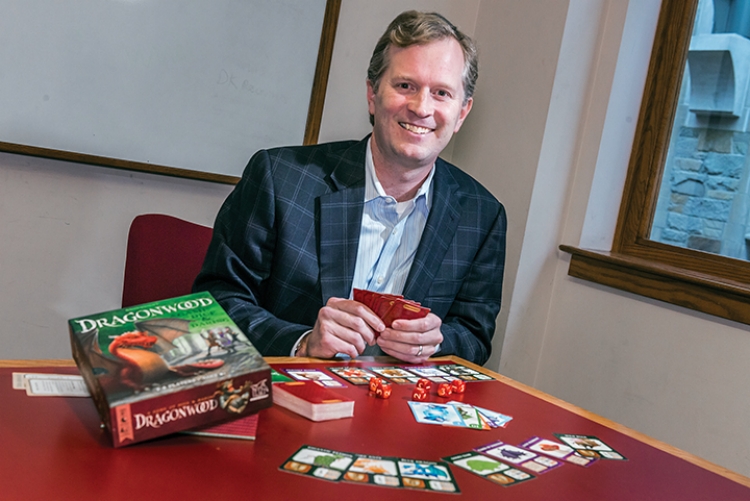
By
Board games are not on the Christmas list for Carroll School of Management Associate Professor of Finance Darren Kisgen and his family.
That’s because the table game his two children love, Dragonwood, was designed by Kisgen himself. A fantasy adventure game that is distributed by the company Gamewright, Dragonwood has picked up several honors since its debut this past summer, including a Mensa Select Award, Oppenheim Best Toy Award, and a Parents’ Choice Award.
It’s also received the thumbs-up from professional board game reviewers: “I highly recommend Dragonwood for families who like this type of game,” wrote one. ”I consider myself to be a hardcore gamer and I personally loved Dragonwood.” Wrote another reviewer: “It just may be an amazing way to teach basic game concepts to kids.”
“It’s incredibly gratifying,” says Kisgen, who worked on the game for two years before it went to market. “Of all that I’ve ever accomplished, this is one of the things I’m most excited about.”
This holiday season, Kisgen’s creation is being sold around the world in toy stores and on Amazon, where the average user rating is an impressive 4.8 out of 5.
The success of Dragonwood is an unexpected Christmas gift for Kisgen, who simply set out to create a game just for his kids. “Then I thought, ‘Why not send it off to a publisher and see if they want to do it?’ I wanted to create something that I would find interesting and would include some sort of challenging trade-offs and decisions, but that kids would find pretty easy to pick up and fun to play.
“Hopefully, Dragonwood will get kids away from playing video games or watching TV for a little while. I’m just very happy about that.”
In Dragonwood, players collect sets of cards to earn dice, which they roll to capture creatures in a fantasy forest. Three sets of cards in combinations similar to gin rummy or poker (cards of same color, numbers in a row, sets of the same numbers) allow one to “Stomp,” “Strike” or “Scream” at creatures such as fire ants, a grumpy troll, giggling goblins, spiders, or an orange dragon. Players also use enhancements – a Silver Sword, Magical Unicorn or Friendly Bunny – to help them along the way.
It may not sound like the kind of game one would expect from a finance professor, but Kisgen’s math background was a key asset in Dragonwood’s development.
“In developing the game, I had to do quite a few fairly complicated probability calculations to get the number on the card right so they’d make sense, and to create interesting trade-offs. There are decisions you have to make: How many dice do you roll? Do you go for this creature worth more points where you need a higher number or lower points for an easier number to roll? Getting that requires some decent, but not overly complicated, math.
“This is a type of game that parents can play with their kids, around the table,” adds Kisgen, whose nine-year-old son helped come up with some of the card names. “There’s nothing inappropriate for kids about it, and everyone is using their head. There’s laughter and fun.”
Kisgen grew up designing games to play with his family and friends, and is thrilled to see his childhood hobby turn into a mainstream success. Dragonwood is being sold not only nationwide, but throughout Canada and Europe and in places such as Singapore, Australia and New Zealand.
“I’ve heard that it’s being used in several schools as a teaching tool for probabilities, number patterns and basic strategy. I’m very excited - I love that that’s happening.”
Already, Kisgen is considering modifications and expansions to Dragonwood, based on consumer reactions.
“Some people have suggested in the reviews that it would be great to have more creature cards or some add-on decks. I have some other ideas as to what to do with the game. There’s always that trade-off though: if I add more on, it will make the game more complicated and I think one of the appeals is that it’s fairly easy to pick up and play.”



